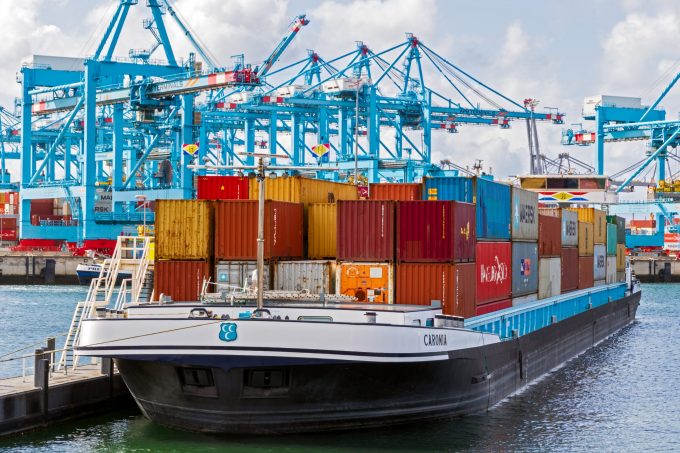Rates reflect strong demand bounce and call for more ocean capacity
Despite generally weak cargo demand, spot rates on the Asia-Europe trades continued to show gains ...
FDX: ABOUT USPS PRIVATISATIONFDX: CCO VIEWFDX: LOWER GUIDANCE FDX: DISRUPTING AIR FREIGHTFDX: FOCUS ON KEY VERTICALFDX: LTL OUTLOOKGXO: NEW LOW LINE: NEW LOW FDX: INDUSTRIAL WOESFDX: HEALTH CHECKFDX: TRADING UPDATEWMT: GREEN WOESFDX: FREIGHT BREAK-UPFDX: WAITING FOR THE SPINHON: BREAK-UP ALLUREDSV: BREACHING SUPPORTVW: BOLT-ON DEALAMZN: TOP PICK
FDX: ABOUT USPS PRIVATISATIONFDX: CCO VIEWFDX: LOWER GUIDANCE FDX: DISRUPTING AIR FREIGHTFDX: FOCUS ON KEY VERTICALFDX: LTL OUTLOOKGXO: NEW LOW LINE: NEW LOW FDX: INDUSTRIAL WOESFDX: HEALTH CHECKFDX: TRADING UPDATEWMT: GREEN WOESFDX: FREIGHT BREAK-UPFDX: WAITING FOR THE SPINHON: BREAK-UP ALLUREDSV: BREACHING SUPPORTVW: BOLT-ON DEALAMZN: TOP PICK

Shortages of seasonal workers have prompted delays across Europe’s inland waterways, leaving many in the sector aggrieved at the failure to address the years-long problem.
According to barge operator Contargo, delays hit 44 hours and 72 hours at Antwerp and Rotterdam, respectively, with one source in the sector highlighting the issue neither industry nor government had “bothered to address”.
“This is nothing new, we see it each summer: the typical seasonal worker shortages across inland terminals,” the source told The Loadstar.
“Every holiday season we experience this challenge from the start of July until the end of August. But it has become more worrying that it seems to be accepted and that no one wants to address it, particularly with Rotterdam’s box capacity set to double by 2033.”
The impact of summer worker shortages can be particularly pronounced if low water (a common occurrence) exacerbates delays.
Speaking with Dutch outlet Der Telegraaf, Rosanne van Houwelingen, researcher in port economics at Erasmus Centre for Urban, Port and Transport Economics, said the worker shortages could leave Rotterdam unable to service its increased capacity.
Inland consultant Gunther Ginckels, of SeasC4U, told The Loadstar: “The main challenge is that there is an outflow of older workers leaving the sector.
“Very few young people are attracted to these jobs, because there is little to no prospect for development – the sense is ‘once a crane operator, always a crane operator’, and very few young people want that for the next 42 years of their life.”
However, one thing Mr Ginckels said the sector did not suffer from was low wages, but there has been little sign this is sufficient to encourage younger people into the fold, he added.
Governments, labour unions and port authorities had made attempts to address the issue, but he believed that with the low interest from young people to move into the role, it would prove difficult.
However, he did suggest legislative changes in Belgium could help to ease some of its immediate seasonal issues, pointing to the Law Major, which governs dockworkers.
Under this law, dockworker status can only be granted to those affiliated with a union, which some have suggested blocks port operators’ ability to hire seasonal workers from neighbouring countries to cover shortages.
Comment on this article